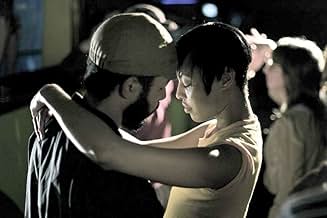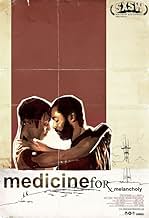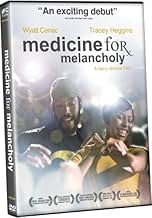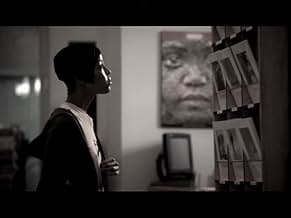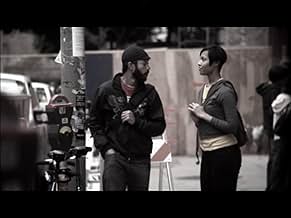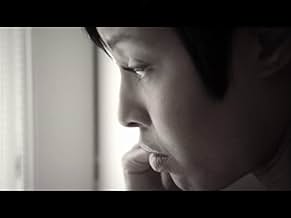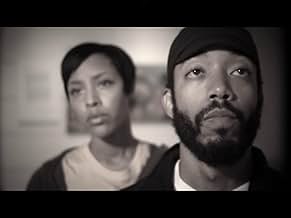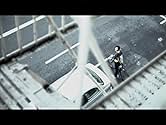IMDb RATING
6.6/10
2.9K
YOUR RATING
Twenty-four hours in the tentative relationship of two young San Franciscans also dealing with the conundrum of being a minority in a rapidly gentrifying city.Twenty-four hours in the tentative relationship of two young San Franciscans also dealing with the conundrum of being a minority in a rapidly gentrifying city.Twenty-four hours in the tentative relationship of two young San Franciscans also dealing with the conundrum of being a minority in a rapidly gentrifying city.
- Awards
- 2 wins & 10 nominations total
Melissa Bisagni
- Sierra Orneilias
- (as Melisa Bisagni)
Chida Emeka
- Hydration Hustler 1
- (as Chidi Emeka)
Ondine Kilker
- Ondine Kilcher - Housing Rights Meeting Attendee
- (as Ondine Kilcher)
- Director
- Writer
- All cast & crew
- Production, box office & more at IMDbPro
Featured reviews
You couldn't make a movie that looks more like my day to day life in San Francisco than this. Telling the story of two black twenty-somethings who meet and have a one night stand, they start off the morning after in Bernal Heights, walk over to Noe Valley for breakfast, hop a cab to the Marina to drop her off, then he heads back to his studio on Geary at Hyde, two blocks from where I once rented a nearly identical apartment, down to the rotating walk-in closet door that once sported a Murphy bed. The couple meet again and head to the Museum of the African Diaspora on Mission and then over to Yerba Buena Gardens to ride the merry-go-round, both a block away from where I work. Later that night they buy stuff for dinner at Rainbow Grocery then head down to the Knockout to dance while my pal DJ Paul Paul spins 45s although his oldies singles are overdubbed on the film's soundtrack with obscure but cool indie rock. But aside from the pleasure of seeing all my usual haunts captured on on film, or digital video rather, Medicine For Melancholy is a smart movie that captures not only the vibe of life in downtown San Francisco, but also the subtleties of the changing ethnic and economic demographics of the second most expensive city in the country. The guy—played by Wyatt Cenac, an occasional correspondent on John Stewart's Daily Show—has a deadpan quarrelsomeness that is occasionally hilarious, because not only is he concerned about the ongoing disenfranchisement of the black community in the city, he's also bugged about the pending disenfranchisement of himself from the girl's pants once her live-in boyfriend returns to town. Her boyfriend, by the way, is white, which Cenac's character tries to elevate to a political issue because of his looming romantic frustration, but she's not having it, which leads to one of the film's best exchanges as they argue about the role race plays in forming their sense of self-identity. Lots of clever relationship stuff, like surreptitiously scoping out each other's MySpace profiles and sharp naturalistic dialogue as they continually negotiate and renegotiate the emotional boundaries and ending point of their one day affair. And maybe the scene with the housing activists meeting was a digression, but you know what, if you live here that stuff is very important and on everybody's mind, and it fits nicely given the context of the film whether you like it or not. Highly recommended.
First, a comment to the two reviewers who found this film 'slow,' etc;
The pace of films - for MOST of the 20th century were at a much slower pace. It lets the director get to know the characters, etc.
In today's film market - in which a HUGE part of the pie is overseas sales/distribution - dialogue doesn't translate, but, ACTIONS do.
That's one of the reasons why most films of the past decade or so, have interchangeable plots, characters - the story is second to the action.
Saying that, let me talk about MEDICINE FOR MELANCHOLY.
I came in a few minutes after it had begun. I'd never seen, nor heard of it (my friend had left the TV on, and was actually watching something prior - FLAWLESS, with R. DeNiro.
I came in when Micah was in a cab bringing the lost wallet he'd found back to it's owner, Jo (I know that they'd had casual sex just before this, and didn't know each other).
I got caught up in the dialogue. It was slow. It as natural, as to how two people meet (awkwardly) at inopportune times.
I quickly picked up on the ambivalence Jo' was having, and Micah, just trying (at first) to get to know Jo a bit.
The film follows them throughout that day - and that night, as the two start to reveal more of themselves. A third important cast member, who's very important, is the sprawling city of San Francisco.
I love the cinematography done on this film. It's a loving portrayal of San Francisco.
The pair walk through streets, and neighbourhoods, that are far from the shiny images tourists see, or think of, when they hear the city's name.
As for the performances of both the two (verbal) actors, I enjoyed their charisma, and I hope to see more from them in the future.
MEDICINE FOR MELANCHOLY is not for people who are impatient, or 'don't get' plots. But, for those who enjoy spending an afternoon, and just letting a film wash over you, this one's definitely one to watch.
The pace of films - for MOST of the 20th century were at a much slower pace. It lets the director get to know the characters, etc.
In today's film market - in which a HUGE part of the pie is overseas sales/distribution - dialogue doesn't translate, but, ACTIONS do.
That's one of the reasons why most films of the past decade or so, have interchangeable plots, characters - the story is second to the action.
Saying that, let me talk about MEDICINE FOR MELANCHOLY.
I came in a few minutes after it had begun. I'd never seen, nor heard of it (my friend had left the TV on, and was actually watching something prior - FLAWLESS, with R. DeNiro.
I came in when Micah was in a cab bringing the lost wallet he'd found back to it's owner, Jo (I know that they'd had casual sex just before this, and didn't know each other).
I got caught up in the dialogue. It was slow. It as natural, as to how two people meet (awkwardly) at inopportune times.
I quickly picked up on the ambivalence Jo' was having, and Micah, just trying (at first) to get to know Jo a bit.
The film follows them throughout that day - and that night, as the two start to reveal more of themselves. A third important cast member, who's very important, is the sprawling city of San Francisco.
I love the cinematography done on this film. It's a loving portrayal of San Francisco.
The pair walk through streets, and neighbourhoods, that are far from the shiny images tourists see, or think of, when they hear the city's name.
As for the performances of both the two (verbal) actors, I enjoyed their charisma, and I hope to see more from them in the future.
MEDICINE FOR MELANCHOLY is not for people who are impatient, or 'don't get' plots. But, for those who enjoy spending an afternoon, and just letting a film wash over you, this one's definitely one to watch.
Barry Jenkins' (Moonlight/If Beale Street Could Talk) first film from 2008. After a nightly hookup, two lovers, Wyatt Cenac & Tracey Heggins, wake the next morning & share some awkward air together which results in some small talk, toothbrushing w/fingers & a shared breakfast & a ride home. Heggins forgets her purse in the taxi causing Cenac to take his bike towards where she got off & going from house to house he finds her where they make some more small talk & then finally decide to spend the day together while bike riding & visiting the sights of the city. Jenkins gets to the heart of those relationships which start in such a cringe manner but the pointed conversations & silences soon win the audience over to stick around to see how this union will play out w/nice low key perfs from the leads & the city of San Francisco itself which gets it due as the perfect backdrop for this love affair in utero.
Micah (Wyatt Cenac) takes Joanne (Tracey Heggins) to the Museum of the African Diaspora on a Sunday afternoon. They woke up that morning in somebody else's house not knowing each other's names after a one-night stand at a party where they both got very drunk. It's San Francisco. They're black. They ride bikes. She was very unfriendly at first, not just because it was a drunken coupling but because she has a white curator boyfriend she lives with who just happens to be in London for the moment, but she loves him.
The first part of this first film by Barry Jenkins, which is shot in digital video tuned to be almost but not quite totally drained of color (like the city, as we are to learn), with pale grays and very white whites, is sustained by Micah's efforts to make Joanne want to spend some time with him. He thinks they ought to get to know each other, and it's a Sunday. She's not at all interested at first. They're both hung over, after all. She lets him take her home in a taxi and then just gets out and runs. But she leaves her wallet on the floor. To go back and find her it takes a search, on his bike, across town, because the address on her license isn't current. The film is also sustained by being very specifically shot in San Francisco. When Joanne goes to a gallery to run an errand it's a very specific gallery. The Museum of the African Diaspora is the Museum of the African Diaspora. The light is San Francisco light. Micah and Joanne are young urban sophisticates. That, as Micah points out, is not only specific but makes them a small minority of a small minority, because gentrification has shrunk the city's blacks to 7% of the city population (New York's proportion is 28%).
Later buying groceries for dinner at his place (because Micah succeeds and Joanne does spend the day with him, and more) they happen upon a group discussing what appears to be the imminent banishment of rent control in San Francisco. Is Jenkins lecturing us, or just treading water? It doesn't matter so much, because the interactions of Micah and Joanne and the wry, cautious words they use when they talk to each other remain central, and are as specific and accurate to who they are (if not to San Francisco) as the cityscapes and the special light.
These two fine actors and this sensitive filmmaker certainly know how to make it real and to record how unpredictably things change from minute to minute. When Micah takes Joanne to the museum, instead of SFMoMA (her original suggestion), and then to the Martin Luther King Memorial at Yerba Buena Center, maybe it's turning into a pretty cool date. But when he leads her over a little bridge there and says, "This is like LA," she just rather coldly says, "Never been," and then, rubbing it in once more and pulling back, "This is a one-night stand." A ride on the merry-go-round at Yerba Buena, she seems to be saying, isn't going to change anything. This delicate homage to a moment is also a rueful acknowledgment of how hard it is to change the way things are.
And it has to be a bit of a lecture, because Micah is "born and raised," while Joanne is a "transplant," and he wants to remind her how the Fillmore and the Lower Haight were wiped out in the Sixties in "Urban Redevelopment:" goodbye black people, goodbye white artists. Micah lives in an immaculate little apartment in the Tenderloin. Micah, as the voice of Barry Jenkins, wants to reclaim San Francisco for everyday people.
Actually, Micah and Joanne seem like a perfect couple. Maybe that's why they can't be together, except just for this one day? You want to just shout out to them, "Can't you just be friends?" They fit so well together. Is this 'Medicine for Melancholy' or just 'melancholy'? Maybe it's medicine 'and' melancholy. That must be it. A fine little lyric of people and a place. And wholly without cliché except maybe for the tagline: "A night they barely remember becomes a day they'll never forget. "
Seen at the San Francisco International Film Festival 2008. This had its debut at SXSW, the South by Southwest Interactive event in Austin, Texas. 'Medicine for Melancholy' tied for the Audience Award for Best Narrative Feature in San Francisco with Rodrigo Pla's 'La Zona.'
The first part of this first film by Barry Jenkins, which is shot in digital video tuned to be almost but not quite totally drained of color (like the city, as we are to learn), with pale grays and very white whites, is sustained by Micah's efforts to make Joanne want to spend some time with him. He thinks they ought to get to know each other, and it's a Sunday. She's not at all interested at first. They're both hung over, after all. She lets him take her home in a taxi and then just gets out and runs. But she leaves her wallet on the floor. To go back and find her it takes a search, on his bike, across town, because the address on her license isn't current. The film is also sustained by being very specifically shot in San Francisco. When Joanne goes to a gallery to run an errand it's a very specific gallery. The Museum of the African Diaspora is the Museum of the African Diaspora. The light is San Francisco light. Micah and Joanne are young urban sophisticates. That, as Micah points out, is not only specific but makes them a small minority of a small minority, because gentrification has shrunk the city's blacks to 7% of the city population (New York's proportion is 28%).
Later buying groceries for dinner at his place (because Micah succeeds and Joanne does spend the day with him, and more) they happen upon a group discussing what appears to be the imminent banishment of rent control in San Francisco. Is Jenkins lecturing us, or just treading water? It doesn't matter so much, because the interactions of Micah and Joanne and the wry, cautious words they use when they talk to each other remain central, and are as specific and accurate to who they are (if not to San Francisco) as the cityscapes and the special light.
These two fine actors and this sensitive filmmaker certainly know how to make it real and to record how unpredictably things change from minute to minute. When Micah takes Joanne to the museum, instead of SFMoMA (her original suggestion), and then to the Martin Luther King Memorial at Yerba Buena Center, maybe it's turning into a pretty cool date. But when he leads her over a little bridge there and says, "This is like LA," she just rather coldly says, "Never been," and then, rubbing it in once more and pulling back, "This is a one-night stand." A ride on the merry-go-round at Yerba Buena, she seems to be saying, isn't going to change anything. This delicate homage to a moment is also a rueful acknowledgment of how hard it is to change the way things are.
And it has to be a bit of a lecture, because Micah is "born and raised," while Joanne is a "transplant," and he wants to remind her how the Fillmore and the Lower Haight were wiped out in the Sixties in "Urban Redevelopment:" goodbye black people, goodbye white artists. Micah lives in an immaculate little apartment in the Tenderloin. Micah, as the voice of Barry Jenkins, wants to reclaim San Francisco for everyday people.
Actually, Micah and Joanne seem like a perfect couple. Maybe that's why they can't be together, except just for this one day? You want to just shout out to them, "Can't you just be friends?" They fit so well together. Is this 'Medicine for Melancholy' or just 'melancholy'? Maybe it's medicine 'and' melancholy. That must be it. A fine little lyric of people and a place. And wholly without cliché except maybe for the tagline: "A night they barely remember becomes a day they'll never forget. "
Seen at the San Francisco International Film Festival 2008. This had its debut at SXSW, the South by Southwest Interactive event in Austin, Texas. 'Medicine for Melancholy' tied for the Audience Award for Best Narrative Feature in San Francisco with Rodrigo Pla's 'La Zona.'
It was lucky that I had a computer nearby so that I could read email while watching this movie. There is a kind of quirky genius to it and I did feel an intimate connection to the characters at times. It felt real and familiar, a little bit awkward to be seeing them so close and personal. In a way the extreme realness of the film was its downfall. Hitchcock once said something to the effect that films are like real life with the boring parts taken out. Too many of the boring parts were left in this film.
The cinematography is weak, but the use of muted colors matches the plodding dullness of the film, which may have been the intention. The music was a strong point, I thought -- it was different and original, fresh and creative.
The cinematography is weak, but the use of muted colors matches the plodding dullness of the film, which may have been the intention. The music was a strong point, I thought -- it was different and original, fresh and creative.
Did you know
- TriviaMade on a budget of $13,000.
- Crazy creditsEach song in the soundtrack appears in the credits with a still frame from the part of the movie where it was used.
- How long is Medicine for Melancholy?Powered by Alexa
Details
- Release date
- Country of origin
- Official site
- Language
- Also known as
- Remedio para melancólicos
- Filming locations
- Production companies
- See more company credits at IMDbPro
Box office
- Budget
- $13,000 (estimated)
- Gross US & Canada
- $111,551
- Opening weekend US & Canada
- $12,625
- Feb 1, 2009
- Gross worldwide
- $111,551
- Runtime
- 1h 28m(88 min)
- Color
- Aspect ratio
- 1.78 : 1
Contribute to this page
Suggest an edit or add missing content





